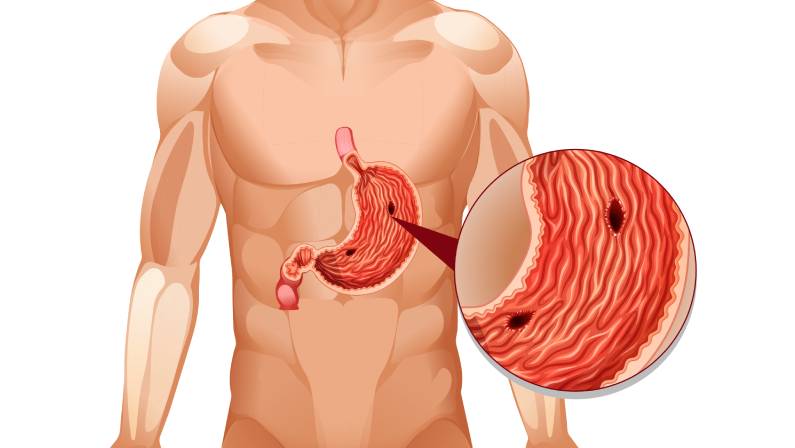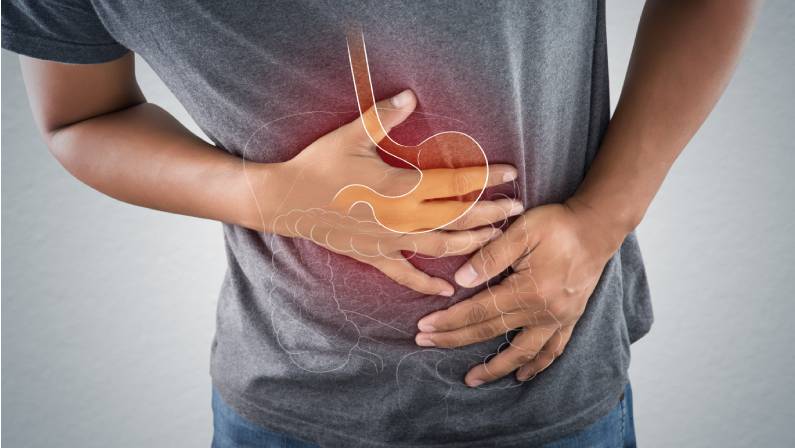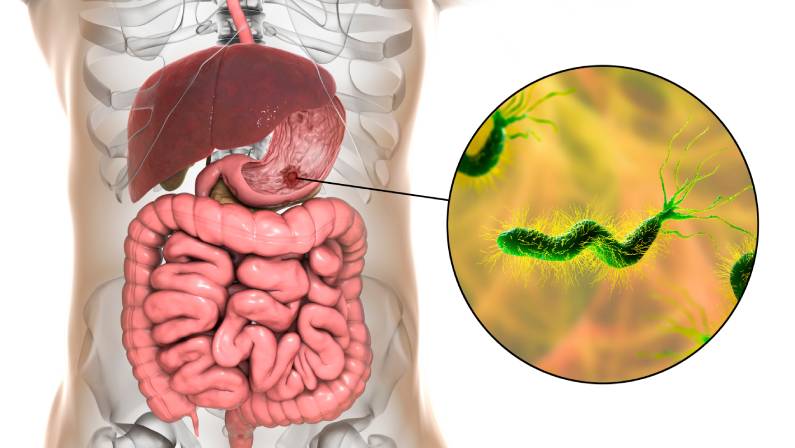Stomach ulcers are sores that develop in the lining of the stomach or small intestine, usually as a result of excessive acid and stress.
Stomach ulcers can cause severe pain, nausea, vomiting, and diarrhea. The symptoms of a stomach ulcer may be similar to those of other medical conditions, so it’s important to get an accurate diagnosis from your Doctor.
What Is A Stomach Ulcer?
Stomach ulcers are sores that form on the lining of your stomach. They can be very painful and cause bleeding.
The cause of most stomach ulcers is a bacteria called Helicobacter pylori (H pylori). Other things that may cause a stomach ulcer include stress, smoking, alcohol, and certain medications.
What Causes Stomach Ulcers?

When the barrier defending the stomach lining from acid breaks down, stomach ulcers develop. This makes it possible for the stomach lining to suffer harm.
This is typically brought on by:
- Contamination with the bacteria Helicobacter pylori (H. pylori).
- Consuming non-steroidal anti-inflammatory medicines (NSAIDs), particularly if they are taken long-term or in large doses, like ibuprofen or aspirin.
- There is scant proof that certain meals or stress trigger stomach ulcers.
What Are The Symptoms Of Stomach Ulcers?
Although a searing or gnawing sensation in the middle of the belly is the most typical sign of a stomach ulcer, not every gut ulcer causes pain.
Some people go through:
Indigestion
One of the most common symptoms of stomach ulcers is indigestion, which is a burning sensation in your stomach that occurs during or after you eat. It’s usually worse after eating a fatty meal or drinking alcohol.
Heartburn
If you have heartburn, you may also experience indigestion. Heartburn is a burning sensation in the middle of your chest that occurs when stomach acid backs up into your esophagus (the tube connecting your mouth to your stomach). It feels like it’s coming from your chest instead of your stomach.
Nausea (feeling unwell/feeling sick)
You may also experience nausea if you have a bleeding ulcer in your upper gastrointestinal tract (stomach and small intestine). The pain associated with an ulcer can cause nausea and vomiting as well as sweating and extreme fatigue due to loss of blood flow in those areas where they are located.
How Are Stomach Ulcers Diagnosed?

Stomach ulcers can be diagnosed by a Doctor who will ask for the following tests:
Gastroscopy
This technique allows a direct view of the stomach to determine whether an ulcer is present.
It entails inserting an endoscope, a thin, flexible tube with a camera inside, into your stomach and the first segment of your small intestine (duodenum).
Stool Antigen Testing/
The stool antigen test has essentially taken the place of the H. pylori antibody test, which once required a sample of your blood to be analyzed (antibodies are proteins made naturally in the blood that aid in infection resistance).
You will require therapy to get rid of H. pylori if you test positive, which will heal the ulcer and stop it from coming again.
Endoscopy
A hollow tube with a lens attached to it called an endoscope is passed down your throat, into your stomach, and small intestine during an endoscopy. Your Doctor examines the endoscope to check for ulcers. If an ulcer is found, your Doctor could take a small tissue sample (biopsy) to be examined in a lab.
How Are Stomach Ulcers Treated?
Stomach ulcers are typically caused by a bacterial infection, which can be treated with antibiotics. However, other treatments can be used when antibiotics are ineffective or if you have an allergy to them.
These include:
Proton Pump Inhibitor (PPI)
PPIs are medications that reduce the amount of acid your stomach produces. They are used to treat peptic ulcers and gastroesophageal reflux disease (GERD). These drugs can also be taken regularly to prevent acid reflux symptoms.
H2-Receptor Antagonists
These medications reduce the amount of acid your stomach produces by blocking histamine receptors in the stomach lining. H2-receptor antagonists are often prescribed together with proton pump inhibitors (PPIs) to treat and prevent peptic ulcers and GERD.
Antibiotics
Antibiotics, such as tetracycline and metronidazole, treat bacterial infections that cause ulcers in the stomach or upper small intestine (duodenum).
Antacids And Alginates
The most common form of treatment for a stomach ulcer is antacids or alginates, which can be taken orally or applied directly to the lining of the stomach. These medications neutralize the acid in your stomach and help protect it from further damage.
Stomach Ulcer Complications

Although complications are uncommon, they can be extremely serious and even fatal.
The following are the primary issues:
- Bleeding at the ulcer’s location.
- Perforation occurs when the stomach lining where the ulcer is located rips open.
- Gastric blockage, or the obstruction of the ulcer, occurs when food cannot pass through the digestive tract.
When To See Doctor For Stomach Ulcer
If you experience any of the following, it’s time to see a Doctor:
- Severe stomach aches for longer than two days with no relief.
- Nausea, vomiting, or diarrhea.
- Fever greater than 101 degrees Fahrenheit (38 C).
- Blood in the stool. (This could be due to appendicitis.)
- Vomiting blood that looks like coffee grounds or black tar. This could be a sign of liver problems or cancer, especially if it is accompanied by jaundice — yellowing of the skin and whites of eyes —or clay-colored stools., which are darker than usual bowel movements.
How Long Do Stomach Ulcers Last

One of the most common questions that people ask is how long do stomach ulcers last?
The answer to this question depends on a number of factors, including:
- The severity of your ulcer. The more severe it is, the longer it will take for you to heal and feel better.
- Your age and overall health condition. If you are young and healthy, chances are that your ulcer will heal faster than someone who is older or already has an existing medical condition (e.g., diabetes).
Overall, there’s no magic number regarding how long it takes for gastric ulcers to heal completely because everyone experiences them differently with varying degrees of severity—and all these factors significantly impact how quickly they’ll go away!
Can Stress Cause An Ulcer?
Stress can be a trigger for ulcers, so you may follow these tips to reduce stress:
Get good sleep.
You’ve heard it before, but it’s worth repeating. Stress can cause bad sleeping habits and make it hard to fall asleep or stay asleep. Try taking a warm bath before bed, or doing something relaxing—reading, listening to music—for 15 minutes before you go to sleep.
Join a gym, so you have something to look forward to when you feel down.
When you’re stressed, working out can help get your mind off of things by doing something positive with your time. A gym membership is a great investment because it’s something that will always be there for you when you need it most. Plus, it’s good for your health!
Take medication if necessary, like antacids or proton pump inhibitors (PPIs).
PPIs decrease the production of gastric acid, creating less irritation for your stomach lining and helping to heal your ulcer faster!
What Foods Help And Hurt A Stomach Ulcer?
Some foods are particularly helpful for those suffering from stomach ulcers, as they can reduce the acidity of your stomach.
These include:
- Whole grains, like brown rice and quinoa
- Fruits with high water content, such as oranges and pineapple
- Vegetables like spinach and broccoli (high in vitamin C)
Who Is At Risk For Stomach Ulcers?
Stomach ulcers affect millions of people worldwide. If you have a family history of stomach ulcers or other medical conditions like Crohn’s disease or celiac disease that increases your risk for developing stomach ulcers, you may be at risk.
It’s important to note that if you take non-steroidal anti-inflammatory drugs (NSAIDs), such as ibuprofen or aspirin, they can also increase your chances of developing a stomach ulcer.
The Bottomline
Ulcers can be very painful and affect the quality of your life, but if you know what causes them and how to prevent them from getting worse, then they can be much easier to manage.
The Rice Emergency Room in Houston, Texas is open around the clock, seven days a week, and has a small patient load and a compassionate staff. Whether it’s an adult or a child, our team of highly trained Doctors and nurses is ready for you 24/7 to handle any emergency.
We guarantee first-rate service with minimal to nonexistent wait times and accurate coverage details provided upfront. In addition to preventing any unwelcome surprises in your monthly statement, we keep your costs as low as possible.
 24x7 Available
24x7 Available

